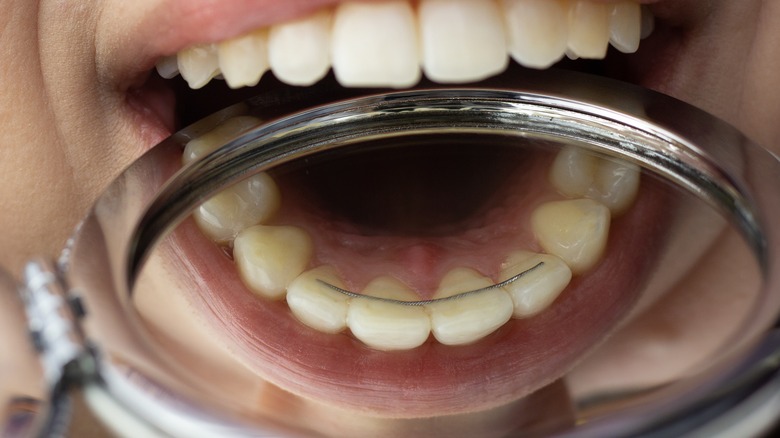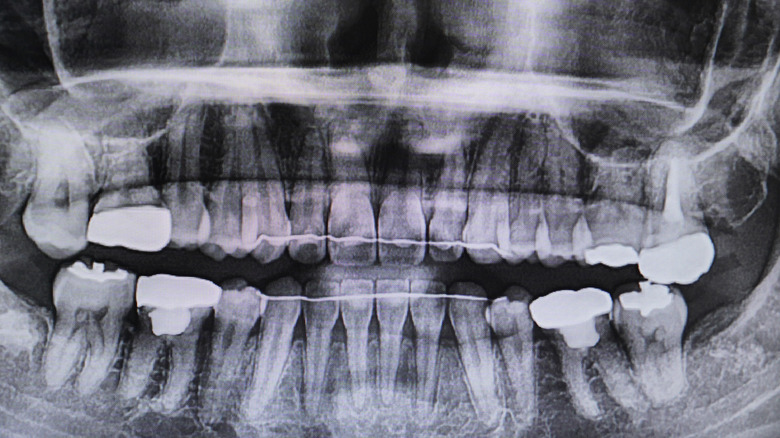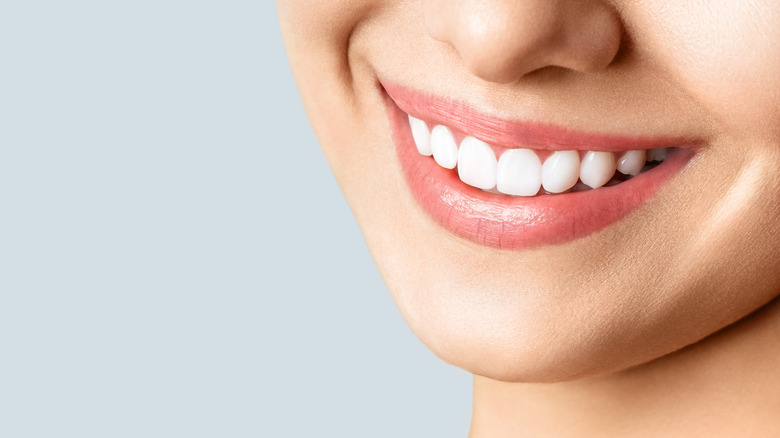What You Should Know Before Getting A Permanent Retainer
If you've had braces or aligner treatments, chances are your dentist or orthodontist has talked to you about retainers. A retainer is typically recommended by a dentist or orthodontist after extensive dental work has been performed. These devices aid in maintaining the position of the teeth by helping to prevent the natural shifting that typically occurs (via Healthline).
What you may not realize is that there is a difference between a removable retainer and a permanent retainer. According to Healthline, removable retainers are typically clear, hard, thin devices that are made to help keep the teeth in place. Permanent retainers are made using a single metal wire or strong fiber that is affixed to the back of the teeth using a special adhesive, per WebMD.
The type of retainer that is recommended by your orthodontist will depend on your individual needs. According to a 2011 study published by the American Journal of Orthodontics and Dentofacial Orthopedics, it can take upwards of seven months or longer before an alignment treatment is considered "permanent". BracePlace adds that teeth also shift naturally as a person ages. Therefore, without the use of a retainer, you may find yourself needing braces or alignment treatments a second time.
While a removable retainer seems like an easy option, your dentist or orthodontist may recommend a permanent retainer. Here are a few things you should know before getting a permanent retainer.
Permanent retainer pros
Permanent retainers help to prevent the teeth from shifting. A permanent retainer may be the better option for some people, according to BracePlace.
First, the permanent retainer offers the freedom of not having the hassle of taking a removable device in and out. This also means a permanent retainer is better for being worn the proper amount of time, unlike removable retainers which can be forgotten (via WebMD). Secondly, the permanent retainer typically offers the option for longer-term alignment maintenance as it is fixed to the teeth, which combats the natural shifting of the teeth over time (via BracePlace).
Another added benefit deals with replacements. A permanent retainer is just that, permanent, at least for the most part, according to Healthline. However, removable retainers are subject to wear, and often need to be replaced due to being worn out over time. In some cases, removable retainers may need replacing in as few as six months.
Some minor drawbacks
As with all things, permanent retainers have a few cons that might be dealbreakers for some. First, oral care and maintenance with a permanent retainer are a bit more taxing, according to Healthline. The bonded wires create a perfect space for harboring bacteria and plaque when not properly cleaned (via Allure). Permanent retainers require extra time and attention paid in the flossing stages of oral health care. While standard floss and floss picks will get the job done, TeethTalkGirl recommends using a water flosser, which provides a stream of water to gently but effectively remove plaque and food particles from your permanent retainer.
Another factor to consider is if the permanent retainer becomes damaged. While the permanent retainer can last almost indefinitely with proper care (per Healthline), sometimes accidents happen. The cost of replacing a damaged or broken permanent retainer is often the same as the initial placement, according to WebMD. Like many orthodontic clinics, Sequence Orthodontics provides patients with a list of foods to avoid to reduce the risk of damage to the retainer wire or bonding.
When considering the options for maintaining your perfect smile, a permanent retainer may be a good fit for your care plan. As always, it's best to discuss your individual dental health needs with a licensed professional.



